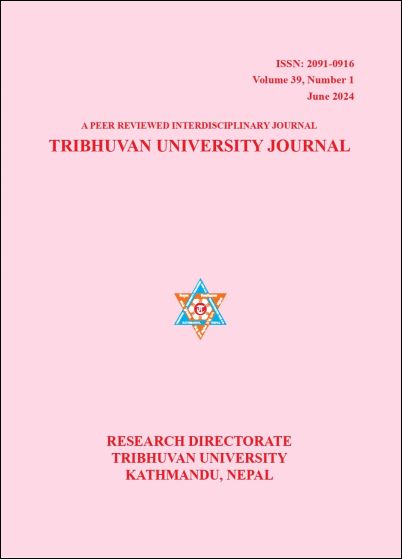Exploring Dalit Characters and their (Imposed) Professions in Dulal’s Gahugoro Africā
DOI:
https://doi.org/10.3126/tuj.v39i1.66666Keywords:
caste division, caste discrimination, Gahugoro Africā (Brown Africa), representation and untouchable practicesAbstract
This paper presents Dalits of Nepal as Africans as represented in the poem Gahugoro Africā by Bishowbhakta Dulal. Dalits are primarily artisans who engage in various tasks such as crafting temple idols, cobbling shoes, plough fields, sweeping streets, and playing musical instruments like the lyre and tum-tum. Despite their skillful performance, as expected by the so-called upper caste people, they are neither adequately paid nor decently treated. Instead, they are often hated, humiliated, discriminated, exploited and traumatized in the society. Therefore, this paper aims at exploring the predicaments of the Dalit characters and their imposed professions as depicted in the primary text. The research is significant due to its focus on the inhuman treatment and miserable existence of Dalits in the same society. The exploration of diverse cultures and cultural practices is valuable to academia. The research is conducted using a library-based qualitative approach, utilizing relevant texts and sources to analyze the representation of Dalit characters and their professions. The researcher has implemented cultural studies perspective using Stuart Hall’s ideas of representation as the main theoretical parameters and Ambedkar, Pandey and Ghurye’s ideas of caste discrimination and untouchable practices as supporting tools. The text Gahugoro Africa was chosen purposively and the data were collected by text information, description and record keeping. Dalits: Kami, Sarki, Damai, Cyame, Badi, Gaine and Mushahar are considered untouchables and distanced in Nepali society though they have been playing productive roles through their imposed professions. So, the speaker in the poem strictly demands freedom from every type of shackle of discrimination and 36 untouchable practices. Freedom from such evil practice is inevitable for Dalits in human civilization and it is the representative voice of Dalits.
Downloads
Downloads
Published
How to Cite
Issue
Section
License

This work is licensed under a Creative Commons Attribution-NonCommercial 4.0 International License.
This license enables reusers to distribute, remix, adapt, and build upon the material in any medium or format for noncommercial purposes only, and only so long as attribution is given to the creator.
© Center for Research, Tribhuvan University

